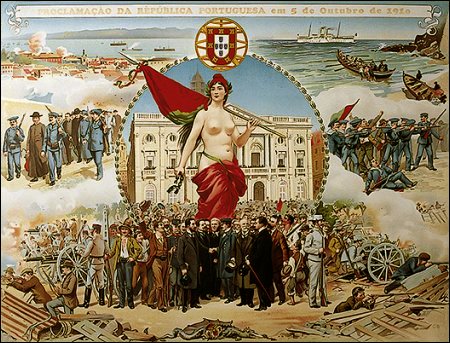 Sunday, October 10, is the 100th anniversary of the establishment of the first republic in Portugal. Relatively short-lived--it died in 1926 with the conservative wave that brought António Salazar to power--it nevertheless is celebrated by many in Portugal today as a first step toward a democratic, progressive state.
Sunday, October 10, is the 100th anniversary of the establishment of the first republic in Portugal. Relatively short-lived--it died in 1926 with the conservative wave that brought António Salazar to power--it nevertheless is celebrated by many in Portugal today as a first step toward a democratic, progressive state.There will be events marking the anniversary in Portugal itself and in Portuguese communities around the world. In Montreal, the weekly Portuguese language newspaper A Voz de Portugal is featuring this allegorical picture from the period on its front page, as well as a long story giving the history of the republic on the inside.

The same edition also carries a large ad for another celebration, this one commemorating the appearance of a vision of the Virgin Mary to three children in the poor Portuguese village of Fatima in October 1917. The Republic was militantly laic, authorizing divorce and taking control of much church property, so the vision certainly was a welcome one for forces in the society that wanted a return to strong religious values.
The juxtaposition of the two celebrations in Montreal are evidence of the continuing debate over the place of religion in society. No question where I come down: for separation of church and state. But isn't it an interesting irony that Fatima, that symbol of rock-hard Roman Catholicism, is also a common name among Muslim women? What does that say about cultural crossovers?


















2 comments:
Well, Fatima was the daughter of Muhammad and Khadija and a very important figure in Islam. I imagine that the Portuguese Fatima was originally a Muslim shrine or Mosque repurposed after the Reconquista in Portugal?
That is one of those really creepy 20th-century Catholic cults; in Italy Padre Pio comes to mind http://www.buzzle.com/articles/padre-pio-and-the-sainthood-racket.html, as does the lugubrious celebration of the raped and murdered girl Maria Goretti.
The Fátima story seems explicitly anti-Republican. I haven't read much about the Portuguese Republic, but it is inspiring. Are there parties here?
Didn't learn of any parties, but that might be a fact that I'm just out of that particular loop.
Post a Comment